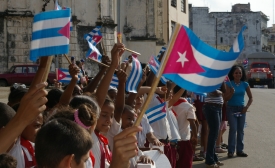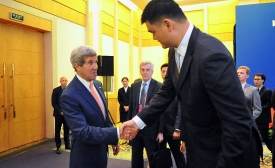U.S. foreign policy

Lost in the controversy of Obama's visit to Cuba is the question of whether isolating Cuba was ever the right move to begin with.
Price and Thrall both pointed out that millennials are not just the largest generation in the United States, but the largest in many regions of strategic interest to the U.S. […] “How American millennials respond to that is going to be one of the defining features of American foreign policy for the next fifty years,” Thrall said.
I used to be asked how the US could deploy its soft power in the Middle East more effectively. That was in the days of the Iraq and Afghan wars and President George W Bush’s ill-advised warnings to the world that “you’re either with us or against us”.
How will the social science experiment of allowing wealth to settle so unequally between the top 1 percent and rest of the United States impact the foundations and contours of U.S. foreign policy?

U.S. public diplomacy tends to react to situations, rather than taking initiative, says Philip Seib.
On Wednesday evening, just before the 13th anniversary of the Sept. 11, 2001, attacks that have shaped modern American history, President Obama gave a speech that outlined a plan for fighting the Islamic State extremist group. Here's some of the reaction from a selection of countries.
Congress has long been concerned that countries receiving American foreign aid frequently oppose U.S. initiatives and priorities in the United Nations. Since 1983, Congress has required the U.S. Department of State to prepare an annual report on the frequency with which other countries vote with the U.S. in the U.N. General Assembly (UNGA).







